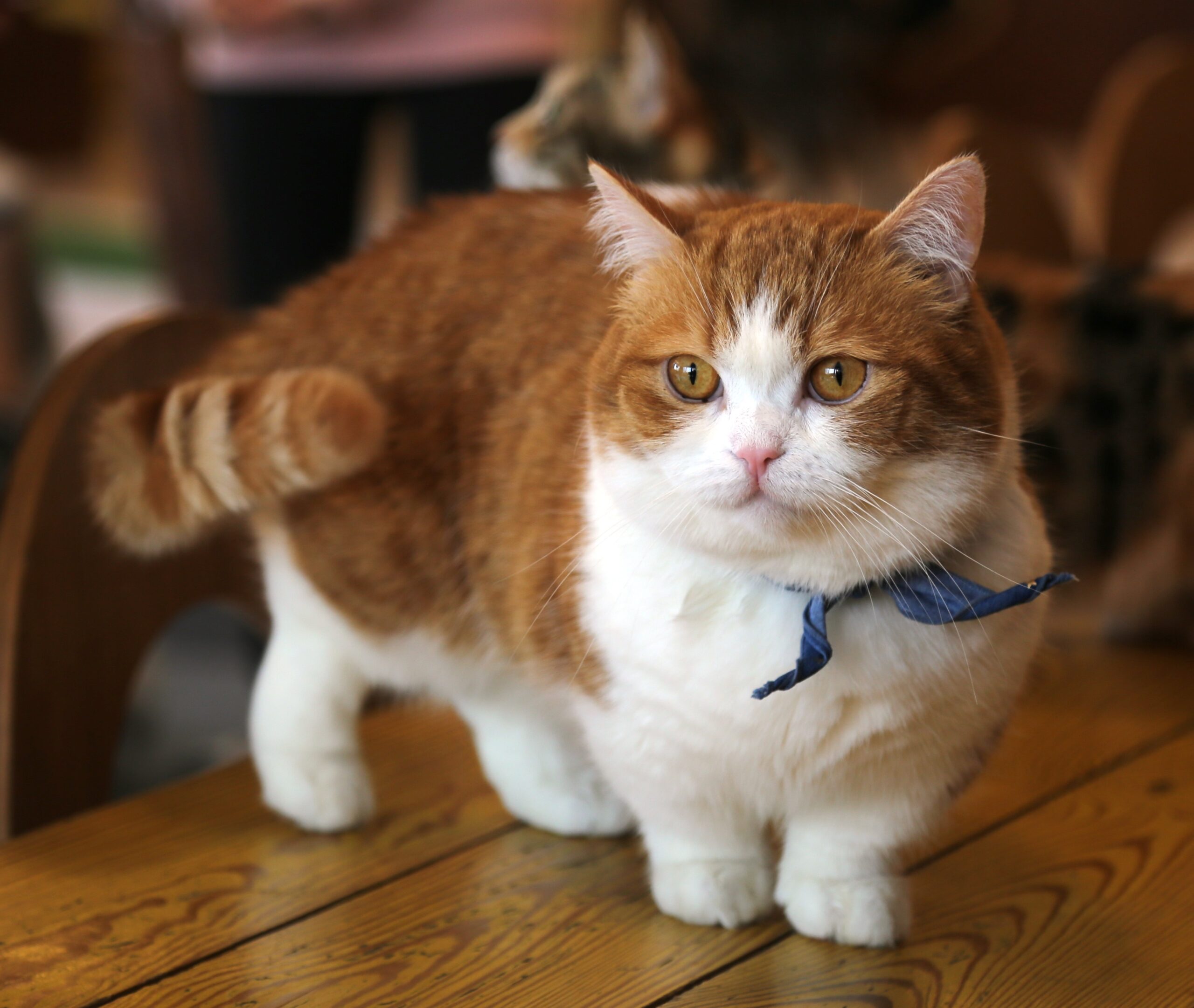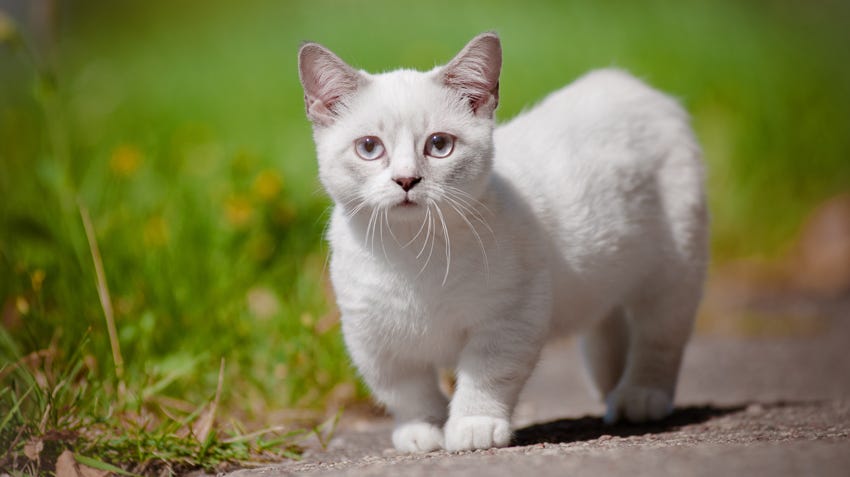Are you thinking about bringing a Munchkin cat into your home? These adorable little cats with their short legs and playful personalities can quickly steal your heart.
But before you make a decision, it’s important to know if Munchkin cats have health issues that could affect your furry friend. You want to make sure your pet stays happy and healthy for years to come. Keep reading to discover what health concerns you should watch out for and how to give your Munchkin cat the best care possible.

Credit: purebredkitties.com
Munchkin Cat Traits
Munchkin cats are famous for their short legs and playful nature. They have unique traits that make them stand out.
Understanding their traits helps owners care for them better. Let’s explore their physical features and behavior.
Physical Characteristics
Munchkin cats have very short legs caused by a natural genetic mutation. Their bodies are medium-sized with a long torso.
They have a variety of coat colors and patterns. Their eyes are large and expressive, adding to their charm.
- Short legs with normal-length bodies
- Medium-sized and muscular build
- Varied coat colors and patterns
- Large, round eyes
- Soft, fine fur texture
Temperament And Behavior
Munchkin cats are friendly and social pets. They enjoy playing and interacting with people and other pets.
They are curious and like to explore their surroundings. Despite their short legs, they can run and jump well.
- Playful and energetic
- Friendly with people and pets
- Curious and adventurous
- Good climbers and jumpers
- Enjoy attention and affection
Common Health Concerns
Munchkin cats have unique short legs. This trait can cause health issues. Many concerns relate to their bones and joints.
Knowing these common problems helps owners give better care. Regular vet checks are important for early detection.
Skeletal Problems
Munchkin cats often face skeletal problems due to their short legs. These cats may develop bone weakness or deformities. Their leg bones can be fragile, leading to fractures. Bone growth issues may also appear in young cats.
Joint And Mobility Issues
Joint problems affect many Munchkin cats. Their short legs put extra stress on joints. This stress can cause arthritis or joint pain. Mobility can become difficult as cats age.
- Arthritis causes stiffness and pain.
- Hip dysplasia may affect movement.
- Elbow dysplasia can cause lameness.
- Joint inflammation can reduce activity.
Spinal Disorders
Spinal disorders are another concern for Munchkin cats. Their short legs may change spine alignment. This change can cause spinal compression or nerve damage. Symptoms include weakness, pain, or difficulty walking.
| Disorder | Symptoms | Treatment |
| Spinal Compression | Weakness, pain, loss of balance | Medication, rest, surgery in severe cases |
| Nerve Damage | Loss of movement, numbness | Physical therapy, pain relief |
| Intervertebral Disc Disease | Pain, difficulty moving | Surgery, medication |
Genetic Factors
Munchkin cats have short legs due to a genetic mutation. This gene affects their bone growth and body structure.
Genetic factors can cause health problems in these cats. Understanding these helps owners care better for them.
Role Of Dwarfism Gene
The dwarfism gene causes the short legs in Munchkin cats. It is a dominant gene passed from parents to kittens.
This gene can sometimes lead to bone and joint problems. These issues might make it hard for the cat to move well.
- Shortened leg bones
- Possible joint pain or arthritis
- Risk of spinal problems
Breeding Risks
Breeding two Munchkin cats with the dwarfism gene can cause health risks. Some kittens may inherit two copies of the gene.
Kittens with two copies often face serious health problems. They may not survive or have severe deformities.
- Higher chance of stillbirths
- Severe bone deformities
- Increased risk of spinal issues
- Possible early death

Credit: katesk9petcare.com
Preventive Care
Taking good care of your Munchkin cat helps keep it healthy. Preventive care can stop many health issues early.
Simple daily checks and regular vet visits make a big difference. Learn how to care for your cat’s health.
Regular Vet Checkups
Schedule vet visits at least twice a year. The vet checks your cat’s weight, teeth, and overall health. Vaccinations and parasite control happen during these visits. Early detection helps treat problems before they get worse.
Exercise And Diet
Keep your Munchkin active to avoid obesity and joint problems. Balanced food supports strong bones and muscles. Avoid overfeeding; Munchkins can gain weight easily.
- Feed high-quality cat food in measured portions
- Provide toys and playtime daily
- Use puzzle feeders to stimulate the cat’s mind
- Limit treats to avoid extra calories
Monitoring Mobility
| Sign | What to Watch For |
| Limping | Favoring one leg or avoiding steps |
| Stiffness | Difficulty standing or moving after rest |
| Reluctance to Jump | Avoiding heights or furniture |
| Changes in Grooming | Less cleaning due to pain or stiffness |
Check your cat’s walking and jumping often. If you see these signs, visit the vet soon. Early care helps keep your Munchkin comfortable and active.
Choosing A Healthy Munchkin
Picking a healthy Munchkin cat is important for a happy life. These cats have short legs, which can cause some health issues. You can avoid problems by choosing carefully.
Look closely at the breeder and health tests before you bring a Munchkin home. This helps you find a strong and lively pet.
Selecting Reputable Breeders
Good breeders care about their cats’ health and well-being. They give proper care and avoid breeding cats with health problems. Finding a trusted breeder means your kitten has a better chance of staying healthy.
- Ask for references and reviews from past buyers
- Visit the breeder’s facility to see the cats
- Check if the breeder follows ethical breeding practices
- Ensure the breeder provides health guarantees
- Look for breeders who socialize their kittens
Health Screening Tests
Health tests help spot common Munchkin cat issues early. These tests reduce risks of passing diseases to kittens. Ask the breeder for test results before buying.
| Test Name | Purpose | Frequency |
| Patella Luxation Screening | Checks knee joint stability | Before breeding |
| Spinal Health Exam | Detects spine problems | Before breeding |
| Genetic Disease Testing | Identifies inherited issues | Before breeding |
| General Health Check | Overall health evaluation | Before selling kitten |

Credit: www.yahoo.com
Living With A Munchkin Cat
Munchkin cats are known for their short legs and playful nature. They make loving pets but need special care.
Understanding their health and home needs helps them live happy and safe lives.
Home Safety Tips
Munchkin cats have short legs that limit their jumping and climbing. Keep your home safe to avoid accidents.
Remove or secure high places where they might try to jump and fall. Use soft mats or rugs to cushion their landings.
- Keep fragile items away from low shelves
- Use ramps or stairs for furniture access
- Block off areas with sharp edges
- Provide soft bedding for rest
Managing Health Issues
Munchkin cats can face some health problems due to their short legs. Regular vet visits help catch problems early.
Watch for signs of joint pain or difficulty moving. Keep their weight healthy to reduce strain on their bodies.
- Schedule yearly vet check-ups
- Monitor for limping or stiffness
- Feed a balanced diet for healthy weight
- Provide gentle exercise to keep muscles strong
Frequently Asked Questions
Do Munchkin Cats Have Genetic Health Issues?
Yes, Munchkin cats can inherit genetic health problems, especially related to their short legs. Spinal issues like lordosis and arthritis are common concerns. Responsible breeding helps reduce these risks, but potential owners should be aware of these inherited conditions.
Are Munchkin Cats Prone To Arthritis?
Munchkin cats have a higher risk of arthritis due to their short legs and altered bone structure. Regular vet checkups and maintaining a healthy weight can help manage arthritis symptoms and improve their quality of life.
How Long Do Munchkin Cats Typically Live?
Munchkin cats generally live between 12 to 15 years. Proper care, diet, and regular veterinary visits contribute to their longevity. Their lifespan is similar to most domestic cats despite their unique body structure.
Can Munchkin Cats Suffer From Spinal Problems?
Yes, spinal issues like lordosis and scoliosis can affect Munchkin cats. These conditions result from their shortened spine and can cause mobility challenges. Early diagnosis and treatment are essential to manage these health concerns.
Conclusion
Munchkin cats can have health issues, but many live healthy lives. Regular vet visits help catch problems early. A good diet and exercise keep them healthy. Owners should be aware of potential spine and joint issues. Understanding their needs ensures a happy, healthy cat.
Always consult a vet for concerns. Choosing a reputable breeder can reduce health risks. Love and care go a long way. Munchkin cats bring joy and companionship. With proper care, they thrive and enchant their families.
